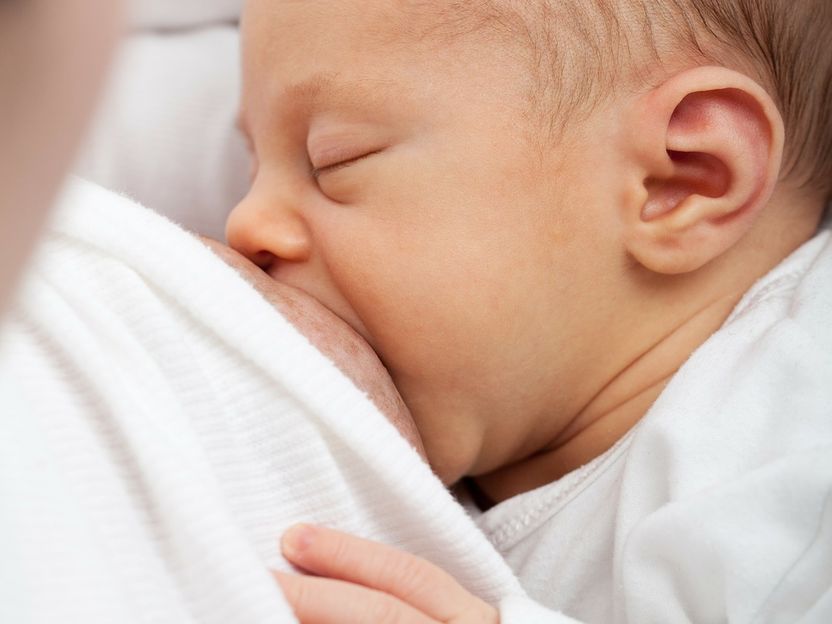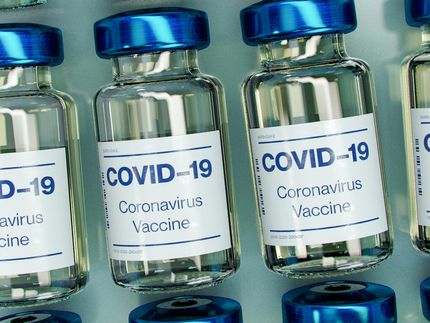Vaccinated women pass COVID-19 antibodies to breastfeeding babies
Research first to detect SARS-CoV-2 antibodies in infant stool
Women vaccinated against Covid-19 transfer SARS-CoV-2 antibodies to their breastfed infants, potentially giving their babies passive immunity against the coronavirus, according to University of Massachusetts Amherst research.

Symbolic image
pixabay.com
The study, published in the journal Obstetrics & Gynecology, measured the immune response to the COVID-19 mRNA vaccine in both breast milk and the stools of breastfed infants.
“This research is the first to detect SARS-CoV-2 antibodies in stool samples from infants of vaccinated mothers,” says lead author Vignesh Narayanaswamy, a Ph.D. candidate in the breastmilk research lab of senior author Kathleen Arcaro, professor of environmental toxicology in the Department of Veterinary and Animal Sciences. “This is really important because women want to know whether their babies have these antibodies, and our study shows that antibodies are being transferred via breast milk. Providing this compelling evidence is motivation for women to continue breastfeeding after they receive the vaccine.”
Narayanaswamy notes another important takeaway: the antibodies were detected in infants regardless of age – from 1.5 months old to 23 months old.
Thirty lactating women from across the U.S. – most of them healthcare workers – were enrolled in the study. They received the COVID-19 mRNA vaccine between January and April 2021. The women provided breast milk samples before they were vaccinated, across two to three weeks after their first vaccine dose and across three weeks after the second dose. They also gave samples of their blood, spotted on cards, 19 days after the first dose and 21 days after the second dose. Infant stool samples were collected 21 days after the mothers’ second vaccination. Pre-pandemic samples of breast milk, dried blood spots and infant stools were used as controls for the study.
The samples were tested for receptor-binding domain (RBD)-specific immunoglobulin (Ig)A and IgG antibodies. In the breast milk samples, anti-RBD IgG antibodies were found to neutralize the protein spike of SARS-CoV-2, as well as four variants. A significant increase in cytokine levels also revealed the immune response in breast milk samples.
Anti-RBD IgG and anti-RBD IgA antibodies were detected in 33% and 30% of infant stool samples, respectively. The levels of antibodies correlated with the vaccine side effects the mother experienced.
“Women who did feel sick from the vaccine was associated with greater antibodies in the infant stool,” Arcaro says. “So you might have felt badly, but that was a benefit for your infant.”
The study, Arcaro says, received no specific funding and was partially driven by the participants themselves, who were familiar with Arcaro’s wide-ranging breast milk research, including the New Moms Wellness Study and BRCA gene-mutation research that Narayanaswamy focuses on.
While lactating and pregnant women were urged to be vaccinated, no pregnant or breastfeeding women were included in the vaccine trials, Arcaro notes. Findings show that “even if you had COVID, there is a benefit for women to get the vaccine.”
Original publication
Other news from the department science
Most read news
More news from our other portals
See the theme worlds for related content
Topic world Antibodies
Antibodies are specialized molecules of our immune system that can specifically recognize and neutralize pathogens or foreign substances. Antibody research in biotech and pharma has recognized this natural defense potential and is working intensively to make it therapeutically useful. From monoclonal antibodies used against cancer or autoimmune diseases to antibody-drug conjugates that specifically transport drugs to disease cells - the possibilities are enormous

Topic world Antibodies
Antibodies are specialized molecules of our immune system that can specifically recognize and neutralize pathogens or foreign substances. Antibody research in biotech and pharma has recognized this natural defense potential and is working intensively to make it therapeutically useful. From monoclonal antibodies used against cancer or autoimmune diseases to antibody-drug conjugates that specifically transport drugs to disease cells - the possibilities are enormous






















































